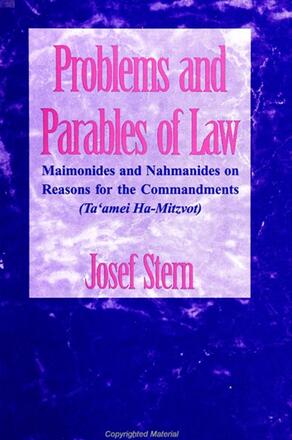
Problems and Parables of Law
Maimonides and Nahmanides on Reasons for the Commandments (Ta’amei Ha-Mitzvot)
Alternative formats available from:
A rigorous analysis of Maimonides' and Nahmanides' explanations of the Mosaic commandments that challenges received notions of the relation between these two seminal thinkers.
Description
A central topic in medieval Jewish philosophy and thought was the explanation of the Mosaic commandments. From Philo and Saadiah on, thinkers sought to uncover "reasons for the commandments" (ta'amei ha-mitzvot) both to demonstrate the rationality of divine legislation and to motivate performance of the commandments. Like many received topics, this enterprise was radically transformed in the hands of Maimonides.
In this first book-length treatment of a subject that has been relatively overlooked by scholars since Isaac Heinemann's classic work in the 1950s, Josef Stern offers an original analysis of two major themes in Maimonides' explanation of the Law and its impact on Nahmanides. The first theme is Maimonides' reconceptualization of the huqqim, those commandments that were traditionally asserted either to have no reason or a reason that is unknown or unknowable. The second theme is Maimonides' application of his method of multi-leveled interpretation that treats texts as parables with "external" and "internal" meaning to the explanation of commandments with multiple reasons. Both of these innovative modes of explanation are adopted by Nahmanides, who refined and adapted Maimonides' structures of interpretation to express diametrically opposed contents. From this perspective there emerges a picture of the relation between these two seminal figures of medieval Judaism that is much more subtle than the received opinion that bluntly opposes them, the radical arch rationalist against the mystical traditionalist.
Inquiry into ta'amei ha-mitzvot served as a locus for discussion of a broad range of philosophical topics: the attributes of God, the grounds of law and legal obligation, the structure of explanation and interpretation, idolatry, friendship and love, the status of astrology and magic, and attitudes toward the body. Stern demonstrates both the philosophical importance of these topics in Maimonides' and Nahmanides' thought and the relevance of their writings to contemporary philosophical discussions.
Josef Stern is Associate Professor in the Department of Philosophy, Committee on Jewish Studies, and in the College, The University of Chicago.